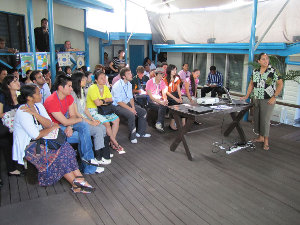 "What are your plans to assist yourself, your family, friends, community and country address the climate change challenge?”, Dr Russell Howorth, Director of SPC Applied Geoscience and Technology Division (SOPAC), issued the challenge to the more than 40 international youth delegates from the 23rd Ship of World Youth Programme who attended a special presentation by SOPAC scientists on their work within the region on climate change.
"What are your plans to assist yourself, your family, friends, community and country address the climate change challenge?”, Dr Russell Howorth, Director of SPC Applied Geoscience and Technology Division (SOPAC), issued the challenge to the more than 40 international youth delegates from the 23rd Ship of World Youth Programme who attended a special presentation by SOPAC scientists on their work within the region on climate change.
The presentation was held at SOPAC headquarters in Suva. Dr. Howorth said that climate change has gained pre-eminence in the debate on development at all levels, national, regional and global. “The ocean is often referred to as the engine room of the global climate,” said Dr Howorth. "It occupies nearly three quarters (75%) of the earth’s surface and stores most of the incoming energy from the Sun. Not only is the Pacific Ocean the largest physical feature on Earth, here in the SOPAC region over 95% of the environment is the Pacific Ocean."
Most of SOPAC’s work is indirectly, if not directly, linked to assisting its island members respond to the climate change challenge, and assisting island communities ensure effective adaptation strategies are in place, and sustainable.
This requires understanding the potential impacts of climate change, and understanding requires information that comes from timely ongoing scientific and technical data collection.
“Put simply, this is the very rationale for SOPAC,” said Dr Howorth. Dr Howorth explained that climate change is not discernable on a daily basis, it is about daily weather events and in particular, extreme weather events, that are changed slowly over time, and whose frequency and intensity may be increasing.
Climate change brings another dimension to a whole range of environmental, social and economic issues to which small island developing states around the world are vulnerable, and it is key to understand how the adverse impacts will affect communities in SOPAC’s island members. Information is essential to understanding what has happened in the past, and what is happening today. Will the frequency and intensity of events increase and thereby, so will the social and economic impacts? Is our capacity to cope increasing, or has it in fact diminished or even been lost?
“Once island communities have this information they can design and implement adaptation strategies that are underpinned with a “No Regrets” approach,” said Dr Howorth. Dr Howorth concluded by saying he hoped the future role of the youth delegates would hinge around “providing No Regrets adaptation strategies: plant drought resistant and salt resistant crops, secure fresh water supplies by fixing leaking pipes and/or taps, build buildings to required building codes, do not build on the high tide line or in river channels.”
The 23rd Ship for World Youth Programme, operated by the Cabinet Office, Government of Japan, involves 144 young people from Japan and a further 144, made up of 12 delegates from each of the partner countries of Australia, Bahrain, Brazil, Chile, Fiji, Federated States of Micronesia, Mexico, Oman, Solomon Islands, Tanzania and Vanuatu.
The aim of the programme is to build capacity and develop youth as future leaders of their countries. While on board, and when visiting countries, the delegates study and discuss common issues from a global perspective. A major theme for discussion is Climate Change and Global Warming.





